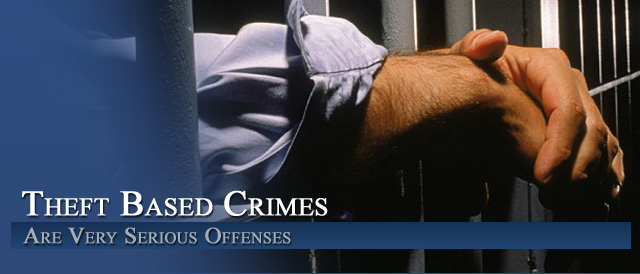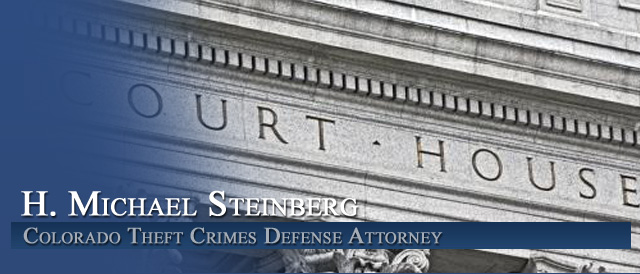




Understanding The Colorado Laws Of Embezzlement, Theft and Larceny Part II of II
By H. Michael Steinberg – Colorado Theft Crimes Criminal Defense Lawyer- Attorney
Understanding The Colorado Law Of Embezzlement, Theft and Larceny requires you to analyze just how an embezzlement case is different than other forms of Colorado theft crimes. This Part II addresses some of the various forms of embezzlement, defense strategies to the charge of embezzlement and includes a look at the federal crime of embezzlement of public property.
Public Corruption In The Form of Embezzlement of Public Property
There is a special law in almost every state – such as Colorado – that governs the theft of public property by those entrusted to protect it.
Here is that law in Coloado:
18-8-407. Embezzlement of public property
(1) Every public servant who lawfully or unlawfully comes into possession of any public moneys or public property of whatever description, being the property of the state or of any political subdivision of the state, and who knowingly converts any of such public moneys or property to his own use or to any use other than the public use authorized by law is guilty of embezzlement of public property.
Every person convicted under the provisions of this section shall be forever thereafter ineligible and disqualified from being a member of the general assembly of this state or from holding any office of trust or profit in this state.
(2) Embezzlement of public property is a class 5 felony
Understanding the Colorado Laws Of Embezzlement, Theft and Larceny – If You Are Convicted Of The Colorado Crime Of Embezzlement You Will Pay Restitution
Restitution is the repaying of the victim of a theft / embezzlement for the monetary value of the money or property embezzled. Restitution is in additional to applicable fines and court costs.
The Law Allows The “Aggregation” Of Multiple Thefts Into One Major Felony
If it is shown that the defendant was responsible for a common scheme or plan of embezzlement, Colorado permits the aggregation of several smaller thefts into one case thus creating a higher total theft and a greater level of potential punishment. Defendants who have embezzled twice or more within a six month period (or more than twice from the same person) as part of a plan or pattern of thefts, may face a higher level of felony after the theft crimes are consolidated into one felony criminal case.
Here is the law on aggregation:
The Colorado “Aggregation of” Theft Crimes 18-4-401 …
(4) (a) When a person commits theft twice or more within a period of six months, two or more of the thefts may be aggregated and charged in a single count, in which event the thefts so aggregated and charged shall constitute a single offense, the penalty for which shall be based on the aggregate value of the things involved, pursuant to subsection (2) of this section.
(b) When a person commits theft twice or more against the same person pursuant to one scheme or course of conduct, the thefts may be aggregated and charged in a single count, in which event they shall constitute a single offense, the penalty for which shall be based on the aggregate value of the things involved, pursuant to subsection (2) of this section.
Embezzlement Crimes In Colorado Can Also Be Filed In United States District Court – The Classic “Federal Case”
Compare Colorado Theft Laws To Federal Embezzlement Charges
In every state the crime of embezzlement may be charged as in either state or court. A federal” white collar crime” will typically involve a very large form of embezzlement. Federal embezzlement charges can involve the direct embezzlement of government money or property by a government employee or the indirect theft of government funds.
As with almost all federal economic crimes – federal embezzlement charges are dependent upon the role of the person involved in the scheme and the total amount of the funds or property taken. If more than $1,000 is embezzled, the crime is punishable by a $250,000 fine and up to 10 years in prison. If $1,000 or less is embezzled, the crime is a federal misdemeanor punishable by a $100,000 fine and up to a year in prison.
Here is the Federal Law As Regards The Crime Of Embezzlement Of Public Funds
18 USC § 641 – Public money, property or records
Whoever embezzles, steals, purloins, or knowingly converts to his use or the use of another, or without authority, sells, conveys or disposes of any record, voucher, money, or thing of value of the United States or of any department or agency thereof, or any property made or being made under contract for the United States or any department or agency thereof; or
Whoever receives, conceals, or retains the same with intent to convert it to his use or gain, knowing it to have been embezzled, stolen, purloined or converted—
Shall be fined under this title or imprisoned not more than ten years, or both; but if the value of such property in the aggregate, combining amounts from all the counts for which the defendant is convicted in a single case, does not exceed the sum of $1,000, he shall be fined under this title or imprisoned not more than one year, or both.
The word “value” means face, par, or market value, or cost price, either wholesale or retail, whichever is greater.
Tactics and Strategies For Defending Against Colorado Embezzlement Charges – Using Complexity As A Defense In Colorado Embezzlement Cases
The sheer complexity of certain white collar crimes such as embezzlement may actually work to the advantage of the defense.
The larger the case filed by small or even medium sized prosecutors offices – the less likely they will either have the time or the sophistication to pursue the highly complex white collar criminal trial. Not only is the local Colorado DA really not very interested in spending days or even weeks and months trying cases with hundreds if not thousands of documents – the entire system is not set up to litigate these cases.
White collar criminal cases may often involve complex concepts and mountains of evidence that tie up criminal courtrooms that are designed for much simpler and much “quicker” forms of trial.
In federal court – the opposite is true. Federal court is specifically designed to “handle” exactly this kind of complex white collar crime.
Tactics and Strategies For Defending Against Colorado Embezzlement Charges – Mental State, Mistake of Fact, and Advice of Counsel As Defenses In Colorado Embezzlement Cases
The mental state of the accused, the relationship of the defendant to the victim, and the complexity of the crime itself, all combine to establish a theory of defense which is calculated to convince a jury that this economic crime is really a civil case wearing criminal or “wolf’s” clothing.
While the “position of trust” placed by the victim on the accused often plays a major role in establishing beyond a reasonable doubt there has been a violation of a duty to the victim and in violating that duty that some type of property or money was illegally taken, it is the mental state of the accused at the time of the alleged theft – the “specific intent to deprive” – that picks up the defense theory from there.
Not only is there a requirement of specific intent to commit the embezzlement – there is also the defense of mistake of fact, that is, that the money or property was such that the accused could reasonably believe it was his property and that he had permission to appropriate it (also known as consent).
Another defense may be that of reliance on the advice of an expert – usually a lawyer – that the accused utilized for advice. The argument is that the specific intent mental state is never achieved because the alleged “conversion” of the money or property was transacted on advice that was detrimentally relied on by the defendant.
Under Investigation For Embezzlement In Colorado? Do Not Delay… Call us.
Understanding The Colorado Laws Of Embezzlement, Theft and Larceny
ABOUT THE AUTHOR: H. Michael Steinberg – Email The Author – A Denver Colorado Theft Crimes Criminal Defense Lawyer – or call his office at 303-627-7777 during business hours – or call his cell if you cannot wait and need his immediate assistance – 720-220-2277.
If you are charged with A Colorado crime or you have questions about Understanding the Colorado Laws Of Embezzlement, Theft and Larceny, please call our office. The Law Offices of H. Michael Steinberg, in Denver, Colorado, provide criminal defense clients with effective, efficient, intelligent and strong legal advocacy. We can educate you and help you navigate the stressful and complex legal process related to your criminal defense issue.
H. Michael Steinberg, is a Denver, Colorado criminal defense lawyer with over 40 years of day to day courtroom experience – specializing in Colorado Criminal Law along the Front Range. He will provide you with a free initial case consultation to evaluate your legal issues and to answer your questions with an honest assessment of your options. Remember, it costs NOTHING to discuss your case. Call now for an immediate free phone consultation.
Helping Clients To Make Informed Decisions In the Defense of Colorado Criminal Cases.
Contact A Lawyer with Three Decades of Experience as a Denver Criminal Attorney at The Steinberg Colorado Criminal Defense Law Firm Today.
Colorado Defense Lawyer H. Michael Steinberg provides solid criminal defense for clients throughout the Front Range of Colorado – including the City and County courts of Adams County, Arapahoe County, City and County of Boulder, City and County of Broomfield, City and County of Denver, Douglas County, El Paso County – Colorado Springs, Gilpin County, Jefferson County, Larimer County, and Weld County,…. and all the other cities and counties of Colorado along the I-25 Corridor… on cases involving … Understanding the Colorado Laws Of Embezzlement, Theft and Larceny.
Other Articles of Interest:
- Understanding The Colorado Laws Of Embezzlement, Theft and Larceny Part I of II
- Colorado Criminal Theft Laws – Understanding The Nature Of Embezzlement Crimes
- Colorado Theft Crimes Defenses – Strategies To Defend Against Theft Charges – 18-4-401
- Understanding The Colorado Identity Theft Law |18-5-902
- Colorado Theft – Statute Of Limitations Starts At “Discovery Of The Crime” – 16–5–401 And 18-4-401.













